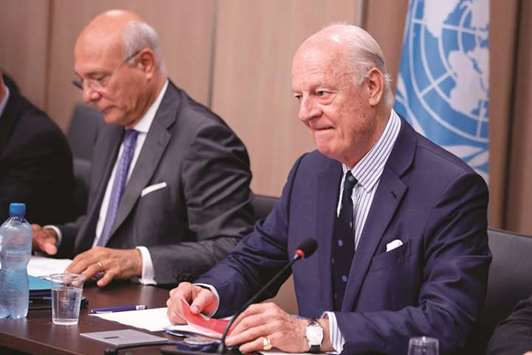Agreements to de-escalate the fighting in Syria could simplify the conflict and help to stabilise the country, but such accords must be an interim measure and avoid partition, UN envoy Staffan de Mistura told a news conference yesterday.
Speaking at the start of five days of peace talks in Geneva, de Mistura said discussions were being held in Amman to monitor implementation of a ceasefire for southwest Syria brokered by the United States and Russia, the first peacemaking effort of the war by the US government under President Donald Trump.
“When two superpowers...agree fundamentally at that level in trying to make that ceasefire work, there is a strong chance that that will take place,” he said.
So far, the agreement that went into force mid-day on Sunday was broadly holding, he added.
He also struck a positive note on ceasefire talks in the Kazakh capital Astana last week, which failed to agree on a monitoring mechanism for a Russian-Iranian-Turkish de-escalation deal but produced a lot of work “in the right direction”.
US Secretary of State Rex Tillerson was in Turkey discussing a particular problem area yesterday, the rebel-held town of Idlib in Syria, de Mistura said, adding that it was a deal that “could almost have been announced”.
The world was perhaps witnessing the simplifying phase of the most complex conflict of our time, the veteran mediator said, adding that de-escalation of the war must be an interim phase and not undermine Syria’s territorial integrity. It should lead rapidly to a stabilisation phase, he said.
Asked if the war was ending after almost six and a half years and hundreds of thousands of deaths, de Mistura said several stars were aligning — on the ground, regionally and internationally.
“In that sense...there is a higher potential than we are seeing in the past for progress.”
De Mistura said he was not expecting breakthroughs in this week’s talks.

UN Special Envoy of the Secretary-General for Syria Staffan de Mistura looks on during a round of negotiation, during the Intra Syria talks, in Geneva, yesterday.
